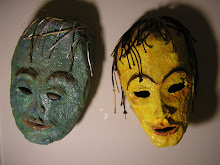The only way to get through the soda aisle was to push my cart between the shelf where a young man was stocking soda bottles and his pallet of bottles.
I waited until a point where I thought it would be the least interruption. "Excuse me," I said, as I pushed my cart through.
"How are you today?" he said without warmth.
Is that what people say now instead of 'excuse me'? I wondered. But I had to reply, "Fine. How are you today?" That's is the minimum response my imprinting considers polite. I found myself saying it as quickly as possible, and not being surprised--though I was still slightly disappointed--when he didn't follow up with the similar minimum 'Fine, thank you'.
I wondered how far 'How are you?' has devolved. Its words haven't yet reached the same artifact status as those in 'How do you do?', which I've often noticed trips up foreigners who understand English but haven't yet learned that it's just a polite phrase spoken at introductions. The only possible verbal response to 'How do you do?' is to repeat (with slightly different emphasis) 'How do you do?'
But 'How do you do?' must originally have meant something like 'How are you?'
At the checkout, I have two cloth bags. They must put the rest of my groceries in plastic. The young woman bagging the groceries asks, "Do you want your milk in a bag?"
"Yes," I reply. "Milk sometimes leaks."
She gives the slight grimace that baggers always give when I make that reply to that question.
I ask, "Did I lose my ecology points for that?"
She asks "What?"
I repeat the question and she smiles.
It occurs to me that using 'ecology' as an adjective in that way places me back in the '70's or '80's. Nowadays, people would use the adjective 'green' instead.
Monday, June 16, 2008
Saturday, June 14, 2008
You try arguing with a 4-year old
I see Rafi's eyelids fluttering, so I bend over and give her a kiss.
"Good morning," I say. "You're a beautiful little girl."
"Are we gonna die?" she asks.
I've heard this before. "Not today," I say.
"Not today?"
"Not this year."
"Not this year?"
"Not for a long long time."
"When? In what month are we going to die?"
"Nobody knows. Nobody knows when they're going to die, but I wouldn't worry about it."
"You wouldn't worry about it? Well, I would."
I give up, leave the room, tell my husband. "I can't argue with that."
"'Because I said so,'" says my husband. "People would be happier if they could accept it. But not from their politicians."
"Good morning," I say. "You're a beautiful little girl."
"Are we gonna die?" she asks.
I've heard this before. "Not today," I say.
"Not today?"
"Not this year."
"Not this year?"
"Not for a long long time."
"When? In what month are we going to die?"
"Nobody knows. Nobody knows when they're going to die, but I wouldn't worry about it."
"You wouldn't worry about it? Well, I would."
I give up, leave the room, tell my husband. "I can't argue with that."
"'Because I said so,'" says my husband. "People would be happier if they could accept it. But not from their politicians."
Monday, June 09, 2008
polyandry is better for raising children
With polygyny, you have more children than one man can support. With two husbands and one wife, you have no more children than one woman can produce, but you have the earning and nurturing power of three adults to raise them.
Three adults can trade off sitting up with a sick child or a sleepless baby. They can take turns babysitting and let the other two go out for a night of adult entertainment.
From a kid's point of view, there's always a dad to help you with your math or show you how to throw a football. And your mom is probably more cheerful and relaxed than other moms.
This could be a solution to middle class financial stress. For those of us making under $100 grand, it should not only be legal, but encouraged.
Three adults can trade off sitting up with a sick child or a sleepless baby. They can take turns babysitting and let the other two go out for a night of adult entertainment.
From a kid's point of view, there's always a dad to help you with your math or show you how to throw a football. And your mom is probably more cheerful and relaxed than other moms.
This could be a solution to middle class financial stress. For those of us making under $100 grand, it should not only be legal, but encouraged.
Subscribe to:
Posts (Atom)
